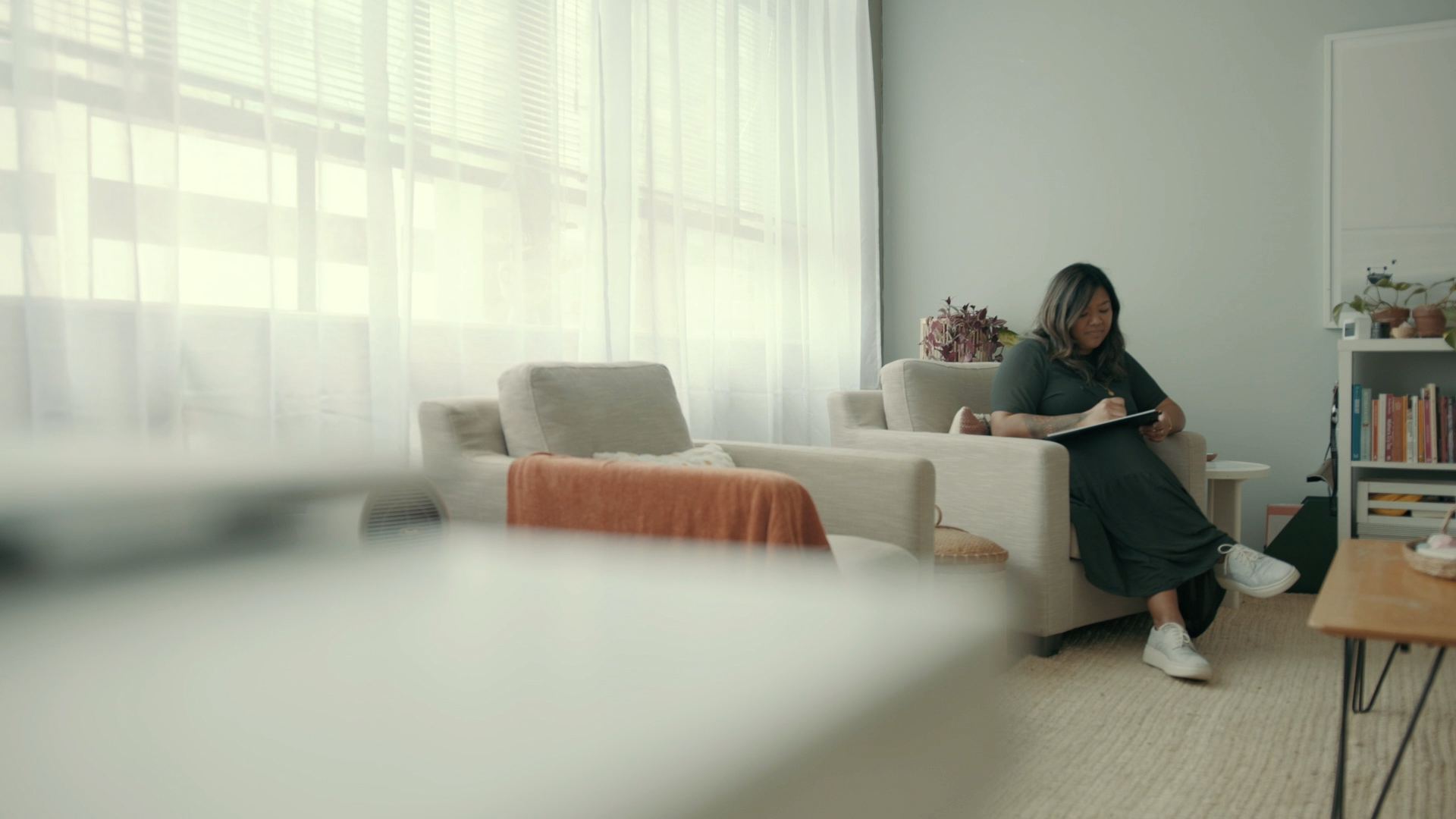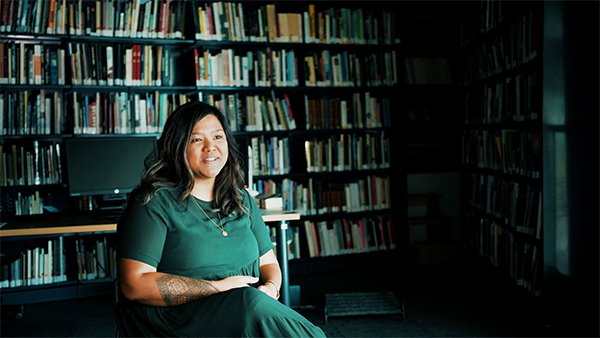Maria Milmine, 2022. Photo by Julie Zhu. Te Papa.
Grace Gassin, Cultural safety in our mental health system is a collective responsibility, Te Papa, 16 March 2023
Cultural safety in our mental health system is a collective responsibility
Maria Milmine is a counsellor in private practice and part of a small collective of Filipino therapists. Her approach to counselling is infused with a critical awareness of how factors such as migration, race, gender, colonisation, and class impact an individual’s mental health. Her work across various mental health spaces has also given her insight into the systemic issues perpetuating disparities for people of diverse Asian and other racialised backgrounds across the wider mental health system.
In this interview, Curator Asian New Zealand Histories Grace Gassin asks Maria about her counselling practice and experiences working in New Zealand’s mental health system. The video featured below was specially commissioned for the ongoing Asian Mental Health project led by Mehwish Mughal.
A lot of your clients identify with one or more Asian heritages or as people of colour. Can you tell me a bit more about your counselling practice? How has it evolved over the years?
I think it’s understandable that people with Asian heritage or other minority groups might search for someone who looks or sounds empathetic to their experience. The current counselling workforce does not yet represent the diversity of Aotearoa. It’s no surprise why people who have melanin in their skin, or who are of Asian heritage, might want to work with me. I think it’s widely known now that the whole mental health system is stretched and this makes it difficult to find support let alone find someone you’d feel comfortable working with.
When I started out in private practice, it was really important to me to be explicit and transparent [with my clients] about who I am, where I’m coming from, and the values that inform my practice. I think a lot about the conditions I look for when considering who might relate to me or have some understanding of the experiences I’ve lived. In times where I have searched for a counsellor for myself, I’ve always considered: who has an understanding of the exhausting work it can be to exist as a brown woman in predominantly Pākehā spaces?
I share with clients that I engage in cultural supervision, I am dedicated to re-indigenising myself and my practice, and I hold that I will never be fully competent in understanding another person’s culture. I have a quote on my website by the creator of @browngirltherapy, Sahaj Koli: “We can never be fully competent in another culture, but with cultural humility and working to expand our own perspectives and practices, we can become more culturally sensitive.” I think it means something to someone that I openly speak about my own racial identity development, personal experiences of racial trauma, and what it means for me to be tauiwi living in Aotearoa.
You offer a limited number of sessions per month at sliding rates for those who would otherwise financially struggle to access mental health support. What led you to offer this? Why isn’t it more common?
I have previously worked in different DHB-funded agencies. It was most meaningful to me that these services were free for tangata whaiora (“people with lived experience of mental distress”). I learned a lot at these places, it was advantageous for my professional development and provided me with learnings about myself, my values, and my boundaries. One thing I did not expect to learn about is how challenging it is to be a brown woman in environments like these, especially if you are outspoken about advocacy and equitable outcomes. While these agencies could provide free services, there were very significant limitations. Usually, there were limitations in choice of therapist, and therefore limited choice in culturally responsive, therapeutic modalities. There were also limitations on the number of sessions available to clients; more often than not, these services offer brief therapy only (three-six sessions), even when longer-term therapy might be more useful.
Inadequate funding is definitely a huge part of the issue, but I think we need to acknowledge the problem is deeper than that; it is structural – there are a lot of people who believe in the status quo, that a ‘one size fits all’ mental health system, i.e. a system designed with the largest group in mind, will extend equally well to all. Many have never heard of the concept of intersectionality, which I think is problematic, and not all health or medical professionals are trained in trauma-informed care. In practice, what this means is other groups’ needs are constantly under-resourced – and these groups, which include many people within our diverse Asian communities, are, sadly, often those who need support the most.
Stepping into private practice, it’s been deeply meaningful and important to me to keep my services accessible where possible for anyone for whom finances are a barrier. I have a margin for generosity built into my business, but I am conscious of the sustainability of the work I do; this is something I assume most counsellors factor in.
In my heart of hearts, I wish that culturally sensitive mental health support, in all of its forms, was free – which is why I’m deeply grateful for partners like Manawaka Ao, they’ve been a huge support in helping me provide free or low-cost counselling for women of colour as well as providing a platform and community where these types of discussions are safely held. I know that I am not the only counsellor out there with a sliding scale. If it isn’t obvious on a website or directory listing you’re interested in, I’d encourage you to ask.

We’ve focused a lot on systemic barriers that people of Asian heritages encounter when they are seeking mental health support as ‘clients’. I’m interested to know what barriers you may have encountered in pushing for change from the ‘other side’ as a mental health worker?
As things stand, there’s a lot of labour involved just to advocate for our communities to even be heard in the mental health space. The expectation is that those of us from minority groups need to extend themselves over and over if they want to get what they need – but, of course, you need resources to get resources, you need funding to get funding, and so it all becomes incredibly difficult.
Even where it may appear that there are spaces for open discussion, there aren’t a lot of opportunities for us to be heard by our professional peers in ways that feel safe. For that to improve, we would need more people from all backgrounds willing to do the work of unpacking their own biases, internalised forms of racism and prejudice. There are so many layers to this issue. At least, I knew how difficult it was for me to be in services that didn’t offer a lot of cultural safety to both tangata whaiora or members of staff.
And also, while it’s obvious to us that people within our diverse Asian communities desperately need support that is culturally safe and responsive, this is not obvious to everyone – the ‘model minority myth’ is still pretty pervasive. When you consider this alongside the way our funding systems are set up, which make minority groups compete against each other for limited funds and resources, you can see how this is not only very damaging for our communities, but also works against solidarity-building and collaboration between all our groups. We all remain isolated and siloed.

I’m sure that your continuing advocacy and therapy work, while rewarding, must take a mental and emotional toll on you. What are some of your own strategies for maintaining mental health?
Yes, absolutely, I’m human too! There are so many things that I try to remember when I’m not feeling myself. I think about the basics: body, connections, me. What does my body need? Sleep, rest, nourishment, movement?
A huge shift in my self-care has been creating a new relationship with rest. Rest, rest, rest. It’s often difficult to be what you haven’t seen and, as a child of Filipino migrants, I didn’t often see my parents rest. However, I now see that for my own wellbeing, as well as my family’s wellbeing, rest is necessary. I used to believe that self-care was selfish, now I’ve come to see that it enables me to continue giving to things that are meaningful to me.
I practise finding joy and pleasure in things that make me feel connected, in an authentic and meaningful way, to my family, community, and ancestry. For me this looks like sharing food with people around the dinner table – connecting with people. I love sharing Filipino recipes and our culture with my children. I recently discovered ceramics and playing with clay. When I’m making and creating, the world sort of stops for a moment; I just get into this flow. It’s beautiful and makes me feel connected in so many ways.
What advice would you give Asian individuals or people of colour who might be feeling a little bit hesitant about seeking formal support?
It can be a process, and it can be tiring, but don’t give up; please keep trying. You matter and your feelings are valid, and there is no shame in seeking mental health support. I mentioned before that I try to stay attuned to my body – as you engage with a therapist, ask yourself, do I feel safe? Do I feel comfortable or was I able to become more comfortable as the appointment went on?
For most types of therapy success lies in the … not chemistry exactly … but sense of connection you have with your therapist. In that first appointment, you get to be in the interviewing seat, so feel free to ask questions and, if it doesn’t feel like the right fit for you, keep going – there are many more of us out there.

